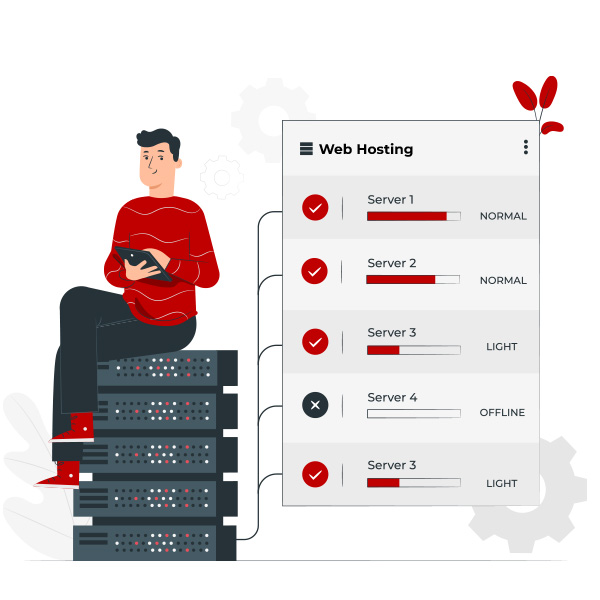
The web hosting industry can often seem filled with technical jargon — especially for business owners and beginners who are setting up their websites for the first time. Understanding the fundamental terms will not only help you choose the right hosting plan but also allow you to make informed decisions about performance, security, and scalability.
At Gotmyhost, we believe in empowering our clients with knowledge. In this article, we’ll explain 10 of the most common web hosting terms in simple, straightforward language — so you can understand exactly what you’re paying for.
1. Domain Name
A domain name is the address of your website that people type into their browser to visit your site — such as www.gotmyhost.com.
Think of it like the street address of your business, while the hosting server is your building. Without a domain, users wouldn’t be able to locate your website on the internet.
Example: www.yourbusiness.com is a domain name registered through a domain registrar like Gotmyhost.
👉 Register your domain from – gotmyhost
2. Web Hosting
Web hosting is the service that stores your website’s files (like images, code, and content) and makes them accessible online.
When someone visits your domain, the hosting server delivers the website data to their browser.
In short: Domain = Address, Hosting = Home of your website.
Gotmyhost provides Shared, VPS, and Dedicated Hosting plans suitable for businesses of every size — ensuring top performance and reliability.
👉 Explore Hosting Packages – https://gotmyhost.com/shared-hosting
3. Bandwidth
Bandwidth refers to the amount of data that can be transferred between your website and its visitors over a specific period.
If your website has heavy traffic or large media files, you’ll need more bandwidth.
Example: A small blog might use 5–10 GB per month, while an e-commerce site could require over 100 GB.
Gotmyhost offers unmetered bandwidth options — giving your site the flexibility to handle high visitor loads without slowdowns.
4. Disk Space (Storage)
Disk space or Storage is the amount of space available on your hosting server to store website files, databases, and emails.
Just like a computer hard drive, more space allows you to store more content.
Example: A portfolio site may need only 1 GB of storage, while a large online store may need 50 GB or more.
At Gotmyhost, all plans come with NVMe SSD storage, providing faster load times and better reliability than traditional HDDs.
5. Uptime
Uptime is the percentage of time your website is online and available to visitors.
A good web host should guarantee at least 99.9% uptime, meaning your website experiences minimal downtime (less than 45 minutes per month).
Reliable uptime ensures your customers can always reach your site, which is crucial for sales and SEO.
Gotmyhost operates to deliver consistent uptime and uninterrupted service.
6. Control Panel (cPanel)
A control panel is a web-based interface that allows you to manage your hosting account.
With tools like cPanel, you can set up emails, manage domains, install WordPress, view statistics, and much more — all without coding knowledge.
Gotmyhost offers user-friendly cPanel access, making website management simple and efficient for all users.
7. SSL Certificate
An SSL Certificate (Secure Sockets Layer) encrypts data exchanged between your website and its visitors. It ensures that sensitive information — like passwords and payments — remains private.
A website with SSL will display a padlock icon in the browser and use https:// instead of http://.
SEO Bonus: Google ranks SSL-secured sites higher in search results.
All Gotmyhost plans include free SSL certificates to help you build trust and protect user data.
8. DNS (Domain Name System)
DNS acts like the phonebook of the internet. It translates human-readable domain names (like gotmyhost.com) into IP addresses (like 192.168.0.1) that computers use to locate websites.
Without DNS, users would have to remember long numeric IP addresses instead of simple domain names.
Gotmyhost provides automated DNS management tools, allowing you to connect your domains to your hosting or external services easily.
9. VPS (Virtual Private Server)
A VPS is a hosting type that gives you more control and resources than shared hosting.
Although multiple users share one physical server, each VPS runs in its own isolated environment — providing better performance and security.
VPS hosting is ideal for growing businesses that need flexibility, higher speed, and root-level access without the cost of a dedicated server.
Gotmyhost offers SSD-powered VPS hosting in Bangladesh, Singapore, Canada, Germany, and the USA, optimized for scalability and reliability.
👉 Explore VPS Packages –https://gotmyhost.com/vps-hosting
10. Dedicated Server
A dedicated server is a physical server entirely reserved for one user or business.
It delivers maximum performance, security, and customization, making it ideal for enterprises, high-traffic websites, or applications requiring powerful hardware.
With a dedicated server, you have full administrative control over your environment.
At Gotmyhost, we provide Ryzen and Intel Xeon-powered Dedicated Servers located in the USA, Bangladesh, Canada, Germany, and Singapore, offering high performance and complete root access for professional use.
Explore Dedicated Server Packages – https://gotmyhost.com/dedicated-server-hosting
FAQ
What is Shared Hosting?
The cheapest and most popular type of hosting for beginners. Your website shares a server with hundreds of other sites. It's like renting a room in a big apartment building—affordable and good for small sites with low to moderate traffic, but performance can slow down if other sites on the server use too many resources.
What is VPS Hosting?
VPS stands for Virtual Private Server. You still share a physical server with others, but your site gets its own dedicated portion of resources (CPU, RAM, storage). It's like having your own private apartment in the building—more control, better performance, and isolation from noisy neighbors. Great for growing sites.
What is Dedicated Hosting?
You rent an entire physical server just for yourself—no sharing with anyone else. Offers maximum speed, security, and customization. It's expensive and usually for large websites or businesses with high traffic. Think of it as owning your own house.
What does Bandwidth mean?
The amount of data your website can transfer to visitors each month (e.g., loading pages, images, videos). Low bandwidth can cause slow loading or extra charges if exceeded. Most plans offer "unlimited" now, but check fair usage policies.
What is Disk Space or Storage?
The amount of space on the server for your website files, images, emails, databases, etc. Measured in GB or TB. Small sites need 10–50 GB; media-heavy sites need more. Many modern plans offer unlimited SSD storage.
What is a Domain Name?
The web address people type to visit your site (e.g., example.com). You buy/register it separately from hosting (via registrars like GoDaddy or Namecheap), then connect ("point") it to your hosting server.
What is DNS?
DNS (Domain Name System) is like the internet's address book. It translates your domain name (example.com) into the server's numeric IP address so browsers can find your site. When switching hosts, you update DNS settings (nameservers) to point to the new server.
What is cPanel?
A user-friendly control panel that lets you manage your hosting account through a web browser. With cPanel, you can upload files, create email accounts, install WordPress, manage databases, view stats, and more—all without coding.
What is Uptime?
The percentage of time your website is online and accessible. Reputable hosts guarantee 99.9% or higher uptime (meaning less than ~45 minutes of downtime per month). Poor uptime hurts visitors and search rankings.
What is an SSL Certificate?
A security certificate that encrypts data between your site and visitors (shows the green padlock and "https://"). Protects sensitive info like logins and payments. Most hosts now provide free SSL via Let's Encrypt—essential for trust and Google rankings
Final Thoughts
Understanding these common web hosting terms is the first step toward building a strong and secure online presence. Whether you’re starting a small blog or running a large enterprise website, knowing what each feature means helps you choose the right plan and provider confidently.At Gotmyhost, we aim to simplify hosting for everyone — by combining clear communication, transparent pricing, and reliable technology.
From domain registration to dedicated servers, we provide complete solutions tailored to the needs of Bangladeshi businesses and global clients alike.







